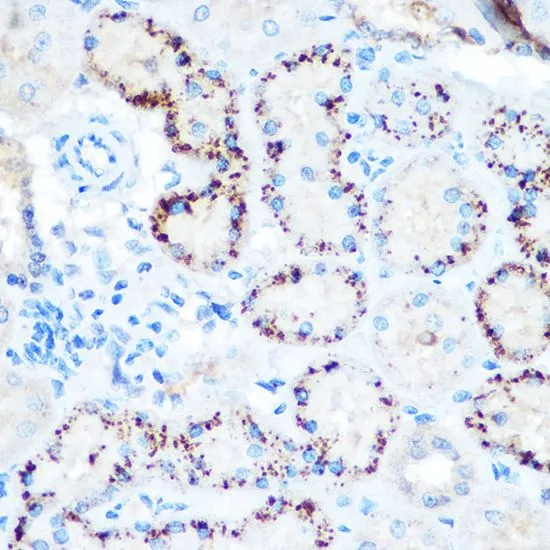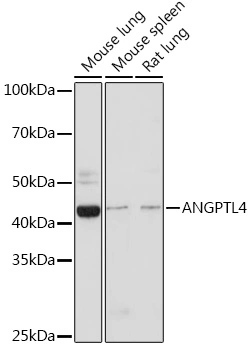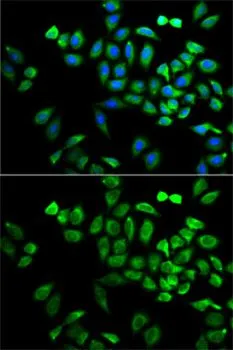
IHC-P analysis of rat kidney tissue using GTX30047 Angiopoietin-like 4 antibody. Dilution : 1:100
Angiopoietin-like 4 antibody
GTX30047
ApplicationsImmunoFluorescence, Western Blot, ImmunoCytoChemistry, ImmunoHistoChemistry, ImmunoHistoChemistry Paraffin
Product group Antibodies
ReactivityHuman, Mouse, Rat
TargetANGPTL4
Overview
- SupplierGeneTex
- Product NameAngiopoietin-like 4 antibody
- Delivery Days Customer7
- Application Supplier NoteWB: 1:500 - 1:2000. ICC/IF: 1:50 - 1:200. IHC-P: 1:50 - 1:200. *Optimal dilutions/concentrations should be determined by the researcher.Not tested in other applications.
- ApplicationsImmunoFluorescence, Western Blot, ImmunoCytoChemistry, ImmunoHistoChemistry, ImmunoHistoChemistry Paraffin
- CertificationResearch Use Only
- ClonalityPolyclonal
- ConjugateUnconjugated
- Gene ID51129
- Target nameANGPTL4
- Target descriptionangiopoietin like 4
- Target synonymsARP4, FIAF, HARP, HFARP, NL2, PGAR, TGQTL, UNQ171, pp1158, angiopoietin-related protein 4, PPARG angiopoietin related protein, fasting-induced adipose factor, hepatic angiopoietin-related protein, hepatic fibrinogen/angiopoietin-related protein, peroxisome proliferator-activated receptor (PPAR) gamma induced angiopoietin-related protein
- HostRabbit
- IsotypeIgG
- Protein IDQ9BY76
- Protein NameAngiopoietin-related protein 4
- Scientific DescriptionThis gene encodes a glycosylated, secreted protein containing a C-terminal fibrinogen domain. The encoded protein is induced by peroxisome proliferation activators and functions as a serum hormone that regulates glucose homeostasis, lipid metabolism, and insulin sensitivity. This protein can also act as an apoptosis survival factor for vascular endothelial cells and can prevent metastasis by inhibiting vascular growth and tumor cell invasion. The C-terminal domain may be proteolytically-cleaved from the full-length secreted protein. Decreased expression of this gene has been associated with type 2 diabetes. Alternative splicing results in multiple transcript variants. This gene was previously referred to as ANGPTL2 but has been renamed ANGPTL4. [provided by RefSeq, Sep 2013]
- ReactivityHuman, Mouse, Rat
- Storage Instruction-20°C or -80°C,2°C to 8°C
- UNSPSC41116161








![Various whole cell extracts (30 μg) were separated by 10% SDS-PAGE, and the membrane was blotted with Angiopoietin-like 4 antibody [N1C2] (GTX114198) diluted at 1:500. The HRP-conjugated anti-rabbit IgG antibody (GTX213110-01) was used to detect the primary antibody.](https://www.genetex.com/upload/website/prouct_img/normal/GTX114198/GTX114198_40156_20190719_WB_M_w_23060501_300.webp)